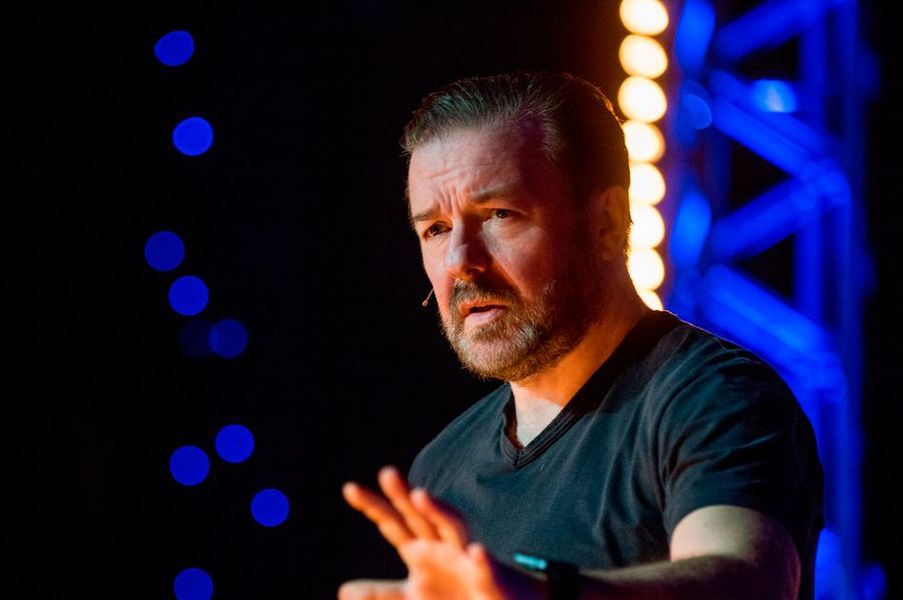Netflix is having the hardest time- both financially and in terms of political correctness. Besides a mass subscriber exodus, plummeting stock prices and an inevitable financial meltdown, the streaming giant is still undeterred in its quest for adding new titles across all shelves, especially comedy titles, many of which have attracted severe backlash and criticism. After the debacle with Dave Chapelle and his Netflix stand-up special Closer, Ricky Gervais has been the latest addition to the list of comedians making “anti-trans” comments while being sheltered by Netflix.
Last year, Chappelle faced immense backlash for his transphobic comments on his Netflix set The Closer, which prompted a mass employee walkout at Netflix headquarters in California, with many criticising Chappelle’s derogatory mindless jokes. From defending the openly transphobic Harry Potter author J.K. Rowling to making derogatory comments about trans bodies, Chappelle’s comedy routine had long-lasting effects as he was attacked on stage this year by a man who was offended by his jokes.
In his latest Netflix special SuperNature, Gervais attracted negative attention for his anti-trans rants.
Within the special, Gervais joked about “old-fashioned women” who are “the ones with wombs”. He then shares a hypothetical conversation with such a woman who is opposed to sharing a restroom with a transwoman. Gervais says, “They are ladies. Look at their pronouns. What about this person isn’t a lady?” He quips, “Well, his penis.”
The Emmy-winning comedian insisted that the special doesn’t reflect his trans and LGBTQ rights views. In the hour-long special, he said that his remarks constitute equal-opportunity humour. In the special, The Office actor targeted a number of minorities, including Holocaust survivors, later defending his jokes by denying how “a joke is a window into a comedian’s true soul” by saying, “That’s just not the case. I’ll take on any view to make the joke funny. I’ll pretend to be right-wing. I’ll pretend to be left-wing. Full disclosure: of course, I support trans rights. I support all human rights. And trans rights are human rights.”
Previously, Gervais was quoted saying, “I’m treating it [Armageddon, one of his comedy specials] like it’s my last one ever. It won’t be, but I want to put everything into it. I want to try and get cancelled. No, I just want to go all out there.”
While comedy is subjective and can often be seen as a grey area between offensive and acceptable, it is important to acknowledge cishet men’s fixation with making jokes about the LGBTQ community, especially trans people. Comedian Hannah Gadsby had addressed a very similar issue in her 2017 stand-up special Nanette. While commenting on politics of gender, power, sexuality and representation, she shared her hatred for the normalisation of jokes that attack queer people. She talked about how she hates how queer comics are forced to laugh at themselves to make light of the situation, emphasising the predicament of the people in the “margins”.
Gervais often argues about how restricting comedy, and emphasising political correctness, would go beyond freedom of speech. He has often compared the situation to that of journalists by saying, “There’s no subject you shouldn’t joke about. It depends on the joke. As a journalist, there’s nothing you wouldn’t write about. It depends on your angle, right? I think a lot of this pious offence comes from people mistaking the target of the joke with the subject.”
Gervais and Chappelle have been backed by Netflix co-CEO Ted Sarandos who even went on to call them “brave”, making us wonder where exactly their bravery lay as men, who conform to heteronormativity in an inherently heteronormative and patriarchal society, making derogatory, transphobic comments against a community that is already at the risk of physical, sexual and emotional violence at all times.
However, if one’s jokes incite or trigger violence of some kind, it is essential for them to take accountability for their actions and comments. Previously, Dave Chappelle’s comments were endemic to a larger problem as hinted by GLAAD and National Black Justice Coalition. They said, “perpetuating transphobia perpetuates violence”, which is an important consideration during present times when the rapid advancement of media and communication might lead to a deadly ripple effect. In simpler terms, the ripple effect would refer to a cause that spreads rapidly due to a certain initiative. In this case, once again, cis-gendered people would have the means to justify their violence against the trans community after coming to terms with the comments.
While Gervais has always emphasised how his jokes are sheer “irony” and never reflect his personal views, it is important for a veteran comedian of his stature to realise how his lack of awareness and his privilege (which he constantly emphasises throughout the special) has blinded him to the volatility of the situation and the kind of violence his seemingly harmless jokes might perpetrate.
If Netflix is still wondering what causes general aversion to their content, they should perhaps take a good look at their shelves. Netflix can do better, Netflix must do better, Netflix could do better- only if they knew where to stop!
